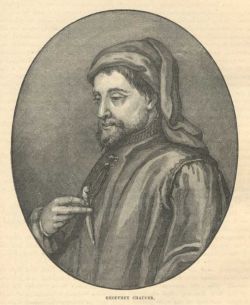Difference between revisions of "Template: Popular article 12 15" - New World Encyclopedia
From New World Encyclopedia
| Line 1: | Line 1: | ||
{{Main page article box| | {{Main page article box| | ||
type=Popular| | type=Popular| | ||
| − | title= | + | title=Geoffrey Chaucer| |
| − | image_name= | + | image_name=Geoffrey Chaucer - Illustration from Cassell's History of England - Century Edition - published circa 1902.jpg| |
| − | image_desc= | + | image_desc=Chaucer| |
| − | text=''' | + | text='''Geoffrey Chaucer''' (c. 1343 – October 25, 1400) was an [[English literature|English author]], [[English poetry|poet]], [[philosopher]], [[Bureaucracy|bureaucrat]] ([[Noble court|courtier]]), and [[diplomat]], who is best known as the author of ''[[The Canterbury Tales]].'' As an author, he is considered not only the father of [[English literature]], but also, often of the [[English language]] itself. Chaucer's writings validated English as a language capable of poetic greatness, and in the process instituted many of the traditions of English poesy that have continued to this day. |
}} | }} | ||
Latest revision as of 17:35, 14 November 2021
Popular Article: Geoffrey Chaucer
Geoffrey Chaucer (c. 1343 – October 25, 1400) was an English author, poet, philosopher, bureaucrat (courtier), and diplomat, who is best known as the author of The Canterbury Tales. As an author, he is considered not only the father of English literature, but also, often of the English language itself. Chaucer's writings validated English as a language capable of poetic greatness, and in the process instituted many of the traditions of English poesy that have continued to this day.
